Top 5 self-help books for improving yourself
Self-help books have been a popular genre for decades, offering readers a wealth of advice, insights, and strategies to improve their lives. Here are five of the best self-help books that have become incredibly popular over the years, along with additional details and insights.
1. “The 7 Habits of Highly Effective People” by Stephen Covey
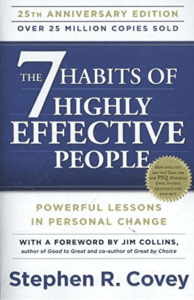
First published in 1989, “The 7 Habits of Highly Effective People” has become a timeless classic in the self-help genre. Covey’s principles have helped millions of people around the world improve their personal and professional lives.
The book outlines seven habits that highly effective people possess and provides practical strategies to help readers integrate these habits into their daily routine. The first three habits focus on personal effectiveness, including being proactive, beginning with the end in mind, and putting first things first. The next three habits center around interdependence, including thinking win-win, seeking first to understand, then to be understood, and synergizing. The final habit is continuous self-improvement, which involves sharpening the saw and striving for balance in all areas of life.
If you’re interested in improving your personal effectiveness, “The 7 Habits of Highly Effective People” is a must-read. It provides a comprehensive framework for personal and professional success and emphasizes the importance of taking a proactive approach to life.
Pros:
- The book provides practical strategies for improving personal effectiveness and achieving success.
- The habits outlined in the book are timeless and can be applied to both personal and professional life.
- The book encourages readers to take a proactive approach to life and to focus on what they can control.
Cons:
- Some readers may find the book to be overly technical and dense.
- The book may not be suitable for readers who are looking for quick fixes or easy solutions.
- Some readers may find the book to be too focused on achieving success and may prefer a more holistic approach to personal growth.
2. “How to Win Friends and Influence People” by Dale Carnegie
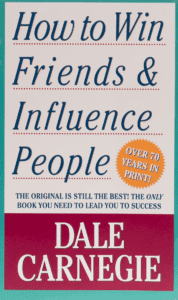
Published in 1936, “How to Win Friends and Influence People” is still one of the most popular self-help books of all time. Carnegie’s book provides practical advice on how to build relationships and influence people positively. The book is filled with real-life examples and easy-to-follow guidelines that anyone can use to improve their social skills.
Carnegie’s principles are based on empathy, respect, and honesty, and the book provides a roadmap for individuals to develop better communication skills and build stronger relationships. Some of the key takeaways from the book include becoming genuinely interested in other people, listening actively, and showing appreciation. The book also emphasizes the importance of being optimistic and positive, as well as the power of persuasion.
If you’re looking to improve your communication and relationship-building skills, “How to Win Friends and Influence People” is an excellent choice. It provides practical advice for building strong relationships based on empathy, respect, and honesty.
Pros:
- The book provides practical advice for building relationships and improving communication skills.
- The principles outlined in the book are based on empathy, respect, and honesty, which are essential qualities for personal and professional success.
- The book emphasizes the importance of being positive and optimistic, which can help readers overcome obstacles and achieve their goals.
Cons:
- Some readers may find the book to be overly simplistic or outdated.
- The book may not be suitable for readers who are looking for more advanced techniques or strategies.
- Some readers may find the book to be too focused on manipulating people and may prefer a more authentic approach to building relationships.
3. “The Power of Positive Thinking” by Norman Vincent Peale
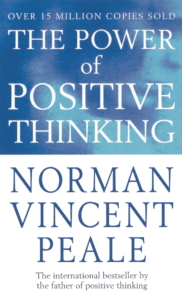
“The Power of Positive Thinking” was published in 1952 and has sold millions of copies worldwide. Peale’s book teaches readers how to change their negative thoughts into positive ones and how to use positive thinking to achieve their goals. The book provides practical techniques and exercises to help readers develop a positive attitude.
Peale’s book emphasizes the power of belief and faith in achieving one’s goals. The book also provides strategies for dealing with stress, worry, and anxiety, as well as ways to cultivate a sense of purpose and meaning in life.
For those who struggle with negative thinking and self-doubt, “The Power of Positive Thinking” offers practical techniques for developing a positive attitude and overcoming negative thoughts.
Pros:
- The book provides practical techniques for developing a positive attitude and overcoming negative thoughts.
- The book emphasizes the importance of belief and faith in achieving one’s goals, which can be empowering for readers.
- The book provides strategies for dealing with stress, worry, and anxiety, which are common issues for many people.
Cons:
- Some readers may find the book to be too focused on religious or spiritual beliefs.
- The book may not be suitable for readers who are skeptical of the power of positive thinking.
- Some readers may find the book to be too simplistic or lacking in depth.
4. “Think and Grow Rich” by Napoleon Hill
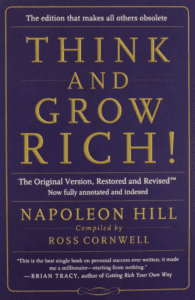
“Think and Grow Rich” was published in 1937 and has since become a classic in the self-help genre. Hill’s book is based on interviews with successful people and provides practical advice on how to achieve success in life. The book emphasizes the power of positive thinking and provides a step-by-step guide on how to create a successful mindset.
The book provides a step-by-step guide on how to create a successful mindset and includes practical exercises and techniques to help readers develop a success-oriented mindset. Some of the key takeaways from the book include developing a burning desire, visualizing success, and surrounding oneself with like-minded individuals.
If you’re interested in achieving success in business and life, “Think and Grow Rich” is a classic self-help book that provides practical strategies for setting goals and developing a success-oriented mindset.
Pros:
- The book provides practical advice for achieving success in life and business.
- The book emphasizes the power of positive thinking and the importance of setting clear goals.
- The book provides strategies for developing a success-oriented mindset, which can be useful for readers who are looking to achieve their goals.
Cons:
- Some readers may find the book to be too focused on material success and may prefer a more holistic approach to personal growth.
- The book may not be suitable for readers who are looking for quick fixes or easy solutions.
- Some readers may find the book to be too focused on achieving success and may prefer a more balanced approach to life.
5. “The Alchemist” by Paulo Coelho
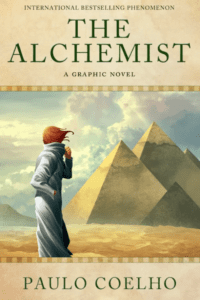
While not strictly a self-help book, “The Alchemist” is a novel that has inspired millions of readers around the world. The book tells the story of a young shepherd who sets out to follow his dreams and discover his purpose in life.
Coelho’s book is a beautiful and inspiring tale that encourages readers to pursue their dreams and live their lives to the fullest. The book provides valuable insights on the importance of following one’s heart, taking risks, and having faith in oneself. The story also emphasizes the need for individuals to be open to new experiences and to let go of their fears and limitations.
If you’re looking for an inspiring story that encourages you to pursue your dreams and live life to the fullest, “The Alchemist” is a great choice. It provides valuable insights on the importance of taking risks and being open to new experiences.
Pros:
- The book provides an inspiring story that encourages readers to pursue their dreams and live their lives to the fullest.
- The book emphasizes the importance of following one’s heart and taking risks, which can be empowering for readers.
- The book provides valuable insights on the need for individuals to be open to new experiences and to let go of their fears and limitations.
Cons:
- Some readers may find the book to be too simplistic or lacking in practical advice.
- The book may not be suitable for readers who are looking for more concrete strategies or techniques.
- Some readers may find the book to be too focused on achieving personal fulfillment and may prefer a more goal-oriented approach to personal growth.
Conclusion:
In conclusion, these five self-help books have become incredibly popular over the years due to their practical advice, inspiring stories, and timeless principles. Whether you’re looking to improve your personal or professional life, these books provide valuable insights and strategies to help you achieve your goals. In addition to the pros and cons outlined above, it’s important to remember that reading a self-help book is only the first step in personal growth and development. To truly benefit from these books, you’ll need to put the principles and strategies into action and make a commitment to ongoing learning and growth.




